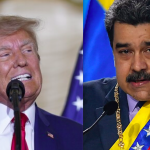In a bold and provocative move, former U.S. President Donald Trump has issued a stark warning: any country or company that purchases oil from Venezuela under the current regime could face retaliatory tariffs if he returns to office.
During a campaign rally this week, Trump criticized the Biden administration for easing sanctions on Venezuela, calling it “a gift to a dictatorship.” He pledged that under his leadership, there would be “severe economic consequences” for entities that support Nicolás Maduro’s government by engaging in oil trade.
“If you buy oil from Maduro, you’ll pay a price. A tariff will be waiting,” Trump declared.
This move signals a potential hardline return to the “maximum pressure” strategy his administration pursued during his first term, aimed at toppling the Venezuelan regime by cutting off its oil revenue—its main source of foreign income.
The statement is already sending ripples through the global energy market. Countries such as China and India, known for continuing trade with Venezuela even during prior sanctions, may now face renewed uncertainty. Energy companies are also watching closely, as U.S. policy shifts could affect crude supplies and pricing volatility.
If implemented, such tariffs could escalate tensions not only with Venezuela but also with key oil-importing nations, complicating diplomatic and trade relations.
A Look Back: Tariffs Imposed by Trump in Office
Trump’s economic legacy is deeply tied to his use of tariffs as a foreign policy and economic tool. Here’s a quick breakdown of some key tariffs imposed during his presidency:
Country/RegionTariff TargetsReasonChina$360B+ worth of goodsTrade imbalance, IP theft, forced tech transferEuropean UnionSteel (25%), aluminum (10%), aircraft, cheeseNational security & Airbus-Boeing disputeMexicoAuto parts, steel, aluminum (proposed tariffs)Immigration pressure and USMCA leverageCanadaSteel (25%) and aluminum (10%)National security grounds (Section 232)IndiaEnded GSP benefits; aluminum, auto parts tariffsMarket access, digital trade rulesTurkeySteel tariffs doubled to 50%Currency crisis, political tensions
Trump used tariffs not just for economic leverage but also to apply political pressure—on allies and adversaries alike. His return to this playbook, starting with Venezuela, suggests a familiar but intensified approach may be in store if he wins in 2024.
Global Instability Caused by Sanctions
Such sanctions and tariffs often lead to global instability, both economically and diplomatically. For example, the U.S.-China trade war contributed to a significant slowdown in global trade growth—from 5.7% in 2017 to just 0.3% by 2019, according to the World Trade Organization. The IMF also warned that escalating tariffs between major economies could reduce global GDP by 0.8% in the medium term, amounting to nearly $700 billion in lost output.
Tariffs can disrupt supply chains that have taken decades to build, causing ripple effects across multiple sectors. Heightened geopolitical tensions, such as between the U.S. and Iran or China, have led to increased defense spending and risk premiums on energy markets. Market volatility tends to rise during these periods—illustrated by the Dow Jones Industrial Average dropping over 1,000 points in August 2019 when Trump announced new tariffs on China.
While these actions are often intended to assert U.S. influence or promote national security, they can also alienate allies, provoke retaliation, and isolate the country on key global issues. “Using tariffs as a foreign policy tool adds a level of unpredictability to global markets that is difficult to price in,” noted Kristalina Georgieva, Managing Director of the IMF. As cooperation breaks down, the global economy becomes more fragmented, less resilient, and more prone to systemic shocks.
Retaliation from Other Countries
Several nations have responded to U.S. tariffs with robust countermeasures, setting off trade conflicts that have reshaped global commerce. China, for example, imposed tariffs on $110 billion worth of U.S. goods, including soybeans, liquefied natural gas, and automobiles, during a trade war that began in 2018. The Chinese Ministry of Commerce stated at the time, “The U.S. has launched a trade war, and we must fight back to defend the interests of our nation and people.”
The European Union retaliated with tariffs on iconic American products such as Harley-Davidson motorcycles, Levi’s jeans, and bourbon whiskey—targeting politically symbolic industries in the U.S. The European Commission declared that these moves were “proportionate and compatible with WTO rules.”
Canada responded swiftly as well. Former Prime Minister Justin Trudeau condemned the U.S. steel and aluminum tariffs as “insulting” and imposed retaliatory tariffs on $12.6 billion in U.S. goods, including ketchup, toilet paper, and steel products. Mexico followed suit with similar measures targeting U.S. agricultural and industrial goods.
These retaliations not only disrupted trade flows but also strained long-standing diplomatic and economic partnerships. They highlighted how tariffs can provoke a domino effect, leading to broader geopolitical tensions and uncertainty in the global economy.
Conclusion
Trump’s recent threat to penalize buyers of Venezuelan oil with tariffs signals a return to his aggressive trade tactics, which have historically reshaped the global economic landscape. While aimed at asserting U.S. dominance and pressuring foreign regimes, these measures often carry the unintended consequences of instability, retaliation, and diplomatic fallout. As the 2024 election approaches, markets and governments alike will be closely monitoring the rhetoric and potential policy shifts that could redefine international trade once again.





